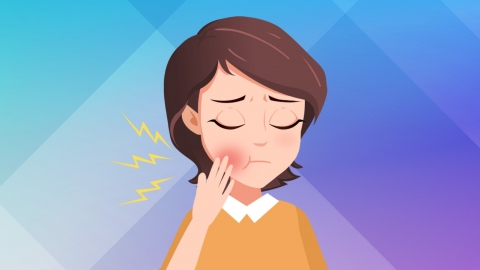What should I do if my tooth hurts when I bite down?
Generally, tooth pain when biting may be caused by factors such as hidden tooth cracks from chewing hard objects, dentin exposure due to long-term wear, dentin hypersensitivity, apical periodontitis, or periodontal abscess. It is recommended to seek medical attention promptly, identify the underlying cause, and improve symptoms under a doctor's guidance through general treatments, medications, surgical procedures, etc. Specific analyses are as follows:

1. Hidden tooth crack from chewing hard objects: Fine cracks on the tooth surface can occur when chewing hard items like nutshells or bones. When biting, these cracks expand under pressure, stimulating the dental pulp nerve and causing pain. Immediately stop using the affected tooth for chewing, avoid biting hard objects, and switch to chewing on the opposite side.
2. Dentin exposure due to long-term wear: Prolonged one-sided chewing or frequent consumption of hard foods can gradually wear down enamel, exposing the dentin. During biting, food stimulates nerves within the dentinal tubules, leading to pain. Brush teeth with a desensitizing toothpaste containing strontium chloride twice daily (morning and evening), each time for three minutes.
3. Dentin hypersensitivity: Tooth wear or wedge-shaped defects expose the dentin, making teeth sensitive to external stimuli. Pain is particularly noticeable during biting and worsens with hot or cold stimulation. Patients should follow medical advice to apply sodium fluoride glycerin paste to the affected area and may undergo laser desensitization therapy as directed by their dentist.
4. Apical periodontitis: Untreated dental caries allow bacteria to invade the pulp and spread to the root apex, causing inflammation at the root tip. Biting applies pressure to this inflamed area, resulting in pain, possibly accompanied by gum swelling. Root canal treatment is required to remove infected tissue at the root tip and eliminate inflammation.
5. Periodontal abscess: In advanced periodontitis, bacterial infection within periodontal pockets leads to abscess formation. Biting puts pressure on the abscess, causing severe pain, and a swollen lump may be felt in the gums. Incision and drainage of the periodontal abscess are necessary to release pus and relieve pain.
In daily life, avoid chewing hard objects and reduce intake of sweets and acidic foods. Consistently brush teeth twice daily using a soft-bristled toothbrush, rinse mouth with warm saline after meals, and schedule regular dental check-ups and cleanings. Proper oral care helps maintain dental and periodontal health and reduces pain when biting.




